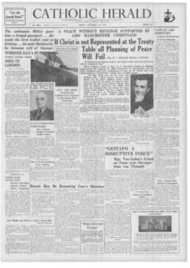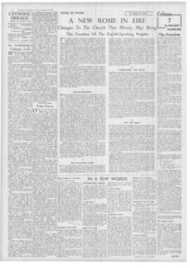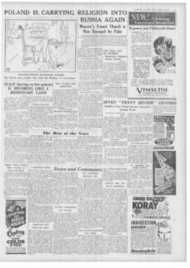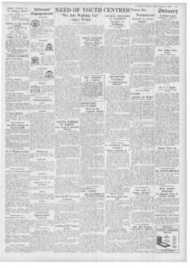Page 8, 10th October 1941
Page 8

Report an error
Noticed an error on this page?If you've noticed an error in this article please click here to report it.
Tags
Share
Related articles
Thoughts On The Feast Of St George
Notes For Ransomers
Notes For Ransomers
Kalendar Of The Week
Edward The Confessor
ENGLISH SAINTS: MONDAY NEXT, OCTOBER 13, FEAST OF ST. EDWARD, KING AND CONFESSOR
St. Edward the Confessor was, until the Reformation, England's patron
by AMELIA DEFRIES GENERAL Viscount Gort at the outbreak of the war, broadcast these words : " Unless a country bases its life on religious faith it cannot endure . The strength of Britain in the past has been built upon service to God, service to our country and service to our fellow men."
This basis of our strength, our freedom, is older by more than 500 years than Magna Carta. Indeed, the origin of our principles is at least 1,500 years old. but their culmination in so far as the first period is concerned, may he identified with the last Saxon king, St. Edward the Confessor, who was until the Reformation England's patron saint ; and who figures on the Great Seal of England, which he instituted, until the time of Cromwell. e
St. George, Crusaders' Patron
The other day someone asked why England had not a saint which was to her what Saint Patrick is to Ireland, the answer is that England had such a saint whose memory lives to-day and whose shrine at Westminster Abbey is the very heart of the Empire.
It was only at the time of the crusades that St. George became England's Patron Saint imported by the returning crusaders. St. Genrge was then added to the Seal together
with St. Edmund and St. Edward. It is only in comparatively recent times, that St. George has come to displace two Englishmen off that Seal. But St. Edward is still revered in England where his spirit lives to this day.
Last year, for the first time, for about 1,000 years, it was impossible to celebrate his feast day, October 13, in the usual way by a full peal of the bells at Westminster Abbey, at which time processions habitually fake place. Catholics having especial dispensation to attend.
On the occasion of their Coronations, King Edward VII, King George V and King George VI, with their Consorts, each presented a new brocaded Pole to St. Edward's shrine on the Altar of which stand candlesticks given the present King and Queen on their wedding. There, whenever there is a ceremony, on the High Altar St. Edward's candles arc lit; there, the Oil is consecrated for a Coronation. And when the Royal Army Medical Corps set up their memorial window, above the grave of the unknown soldier, in honour of their fallen of the last war, that window Was dedicated to St. EdWard, who is the central figure thereon.
Edward's Law
To-day this ancient shrine so simple and unpretentious is the symbol and corner of our liberties for which we are lighting now and which are but developments of Edward's Law, For Edward it was who, having pacified the country after years of strife, invasion and civil war, to such an extent it is said all the countries of Europe came and offered to enter into a league of peace with him, collected the customs and laws of the various Kingdoms into which the country had been divided and resumed these into one code known as " Edward's Law!'
After his death, when by the treachery of Harold the way was opened for the Norman Conquest, William the Conqueror crowned in the Abbey which Edward had built, was obliged to take an oath to keep Edward's Laws which were the last of free pre-conquest Englishmen. These are the words he said " This I will order, that all shall have and hold the Law of King Edward as to land and all other things."
Edward—Legendary Hero
Edward became myth, a legendary hero of a golden age and many are the miracles attributed to him. This oath was taken by every king until the time of Cromwell and, in slightly changed words, even later. The spirit of it remains in the oath taken by the present King at the time of his Coronation after the Archbishop of Canterbury in that ceremony said to him:
" Will you solemnly promise and swear 'to govern the people of this United Kingdom of Great Britain and Northern Ireland and the Dominions thereto belonging according to the Statutes in Parliament agreed upon and the respective Laws and Customs of the sante?"
To which the King replied: " I solemnly promise so to do."
St. Edward's Chair
And so a thousand years' tradition is carried on. To this day the King is crowned in what is known is St. Edward's chair, only once removed by Cromwell from the Abbey (and then only to Westminster Hall). This chair, actually, was made in memory of St. Edward by King Edward I.
The King to this day is crowned with what is known as St. Edward's crown, actually the original was lost, probably by King John, but at the time of the Restoration when a crown was needed for King Charles II a replica was made, thus confirming the ineradicable Dominion of the spirit of St. Edward's Law. This new crown with St. Edward's crown has been used on every Coronation since.
In the words of Dr. J. A. Robinson, late Dean of Westminster, St. Edward's name was a symbol of upright and human Government " never change, threatened the constitution," declared the Dean in 1901. "3ut the People, and the Bishops in the Peoples' name, called for the renewal of the solemn pledge that St. Edward's Laws should be observed, and thus our King, when he was crowned, received St. Edward's crown and also St. Edward's Staff for these are the symbols of equity and justice.' " Round his memorial, which has been called the most lovely and lovable thing in Christendom." as said Dean Robinson, " gathered the whole story of England's greatness . .. whole Empires place claim to be St. Edward's sons."
Barrier to Despotism
It was (in Saxon days) the custom that the English King should not make laws or tax the people without the consent of the National Assembly called the Witenagemot. This was the valuable barrier against mere despotism inherited, and left to us, by St. Edward to the last Saxon King. The Laws which under Edward had been made " Common " were old-establisheO customs such as the rule by which laws or Dooms, as they were called, were not decreed except " with the suffrages of all."
Canute, when he had driven out Edward after Aethelred the Unready, confirmed the Anglo-Saxon custom. Under the AngloSaxon rule, a suiter when he considered that they had denied him justice, might come before the King to lodge a complaint against his judges. Poor and rich alike were entitled to have right done to them in the ordinary Anglo-Saxon courts of justice, especially by St. Edward. In 1840 the Record Commissioners did a enwsiern English translation of the ancient laws and institutes of England which have conic down to us, the first of which is called Leger Edwardi Confessoris; but the slimness of the collection makes it clear that the laws, customs and privileges referred to in the Coronation of William the Conqueror and those which followed him, concerned more custom than actual law, The genuine laws of William the Conqueror are few and those of Edward are not now traceable, for although we have many Charters given by him, we have not any script of a single new law which can be definitely attributed to the Confessor in person. The important point is, however, that it is rather, by custom and in spi: it that he is perpetuated.
This, in itself, is a very English characteristic; little that is changeable remains of the " Glorious Edward," yet his spirit lives on even in modern England. The Empire centres on his shrine, round which the Gothic Abbey was built in his memorial, In fact, to-day nothing changeable remains but this unbreakable, undying spirit.
As Edward himself said on his death-bed, " I shall not die but Jive."
blog comments powered by Disqus









